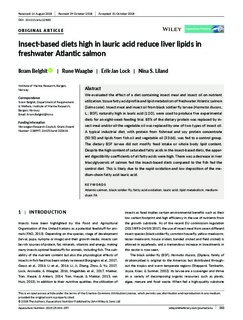Insect-based diets high in lauric acid reduce liver lipids in freshwater Atlantic salmon
Journal article, Peer reviewed
Published version
Date
2018Metadata
Show full item recordCollections
- Articles [3011]
- Publikasjoner fra CRIStin [3061]
Abstract
We evaluated the effect of a diet containing insect meal and insect oil on nutrient utilization, tissue fatty acid profile and lipid metabolism of freshwater Atlantic salmon (Salmo salar). Insect meal and insect oil from black soldier fly larvae (Hermetia illucens, L.; BSF), naturally high in lauric acid (12:0), were used to produce five experimental diets for an eight‐week feeding trial. 85% of the dietary protein was replaced by insect meal and/or all the vegetable oil was replaced by one of two types of insect oil. A typical industrial diet, with protein from fishmeal and soy protein concentrate (50:50) and lipids from fish oil and vegetable oil (33:66), was fed to a control group. The dietary BSF larvae did not modify feed intake or whole body lipid content. Despite the high content of saturated fatty acids in the insect‐based diets, the apparent digestibility coefficients of all fatty acids were high. There was a decrease in liver triacylglycerols of salmon fed the insect‐based diets compared to the fish fed the control diet. This is likely due to the rapid oxidation and low deposition of the medium‐chain fatty acid lauric acid.
